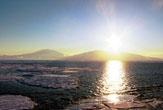UK Report: Time to 'Move On' from Climategate

A new report by a U.K. House of Commons committee maintains "some reservations" about previous investigations into "Climategate," the leaking of thousands of e-mails between climate researchers. Despite these reservations, the committee recommends moving on from the scandal.
In November 2009, a hacker accessed a University of East Anglia server containing thousands of e-mails and documents from the university's Climatic Research Institute. Global warming skeptics claimed the e-mails revealed a cover-up of data that conflicted with research showing the Earth is warming.
A number of investigations were launched, including two independent reviews set up by the university: the Independent Climate Change E-mails Review (ICCER) and the independent Scientific Appraisal Panel (SAP). The investigations cleared the researchers involved with the e-mails of scientific misconduct, and found no evidence of a cover-up.
Now, the new parliamentary review, available on the committee's website, took on the ICCER and the SAP to evaluate the two reviews' findings. The committee found that the SAP could have been more transparent. The ICCER was more open, the committee reported, but did not satisfactorily investigate allegations that some e-mails had been deleted.
"While we have some reservations about the reviews which UEA commissioned, the key point is that they have made a number of constructive recommendations," the report concluded. "In our view it is time to make the changes and improvements recommended and with greater openness and transparency move on."
- Top 10 Surprising Results of Global Warming
- The Top 10 Craziest Solutions for Global Warming
- Earth in Balance: 7 Crucial Tipping Points
You can follow LiveScience Senior Writer Stephanie Pappas on Twitter @sipappas.
Get the world’s most fascinating discoveries delivered straight to your inbox.

Stephanie Pappas is a contributing writer for Live Science, covering topics ranging from geoscience to archaeology to the human brain and behavior. She was previously a senior writer for Live Science but is now a freelancer based in Denver, Colorado, and regularly contributes to Scientific American and The Monitor, the monthly magazine of the American Psychological Association. Stephanie received a bachelor's degree in psychology from the University of South Carolina and a graduate certificate in science communication from the University of California, Santa Cruz.


